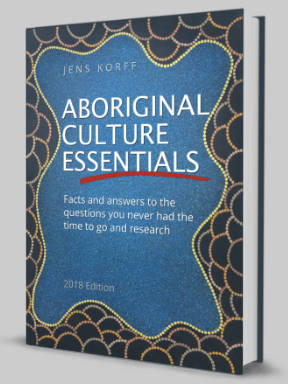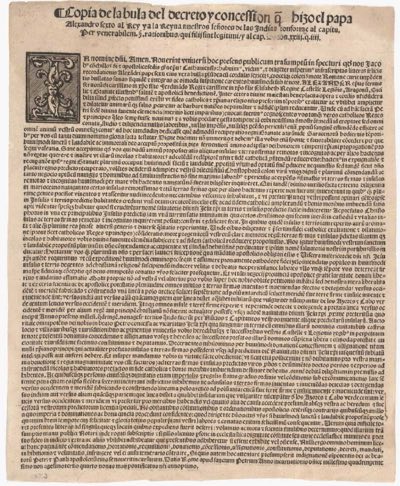Land
How was Aboriginal land ownership lost to invaders?
Aboriginal people owned all of Australia prior to invasion. Why can courts today successfully turn down their land claims?

Wishing you knew more about Aboriginal culture? Search no more.
Get key foundational knowledge about Aboriginal culture in a fun and engaging way.
This is no ordinary resource: It includes a fictional story, quizzes, crosswords and even a treasure hunt.
Stop feeling bad about not knowing. Make it fun to know better.
The 'Doctrine of Discovery' legitimated land grabs
In the Eurocentric view of the world, it was the so-called 'Age of Discovery' when European nations sent out their explorers during the 15th to 17th centuries.
Their governments were greatly influenced by Catholic doctrine and papal power. One doctrine was that Christians had the right to claim lands, territories and resources of Aboriginal people all over the world because they were not Christians.
On 4 May 1493, Pope Alexander VI issued a Papal Bull, “Inter Caetera”, which became known as the Doctrine of Discovery. It was central to the Spanish conquest of what the conquering nations called the 'New World', supporting Spain’s strategy to ensure its exclusive right to the lands 'discovered' by Christopher Columbus.
The Bull stated that any land “not hitherto discovered” by Christians was available to be claimed and exploited by Christian rulers and declared that “the Catholic faith and the Christian religion be exalted and be everywhere increased and spread, that the health of souls be cared for and that barbarous nations be overthrown and brought to the faith itself” [1] (my emphasis).
It basically meant that the "barbarous nations" could be enslaved or murdered if they refused to convert to Christianity. It also meant that Aboriginal peoples' long-standing rights to land could be wiped out.
The Doctrine of Discovery is a key premise for post-invasion government claims to legitimacy on and sovereignty over Aboriginal lands and territories. It was used not only by Spain, but also by former British colonies like Canada, Australia, New Zealand and the United States of America [2] to seize Aboriginal land.
In the USA, where the Doctrine has been enshrined in law, it was used as the foundation for the western expansion [1] and to justify efforts to eliminate Aboriginal languages, practices and world views, and it affects Native American sovereignty and treaty obligations. [3] Courts have based judgements on it as recently as 2005.
As a result of the Doctrine the delusion that white people and Christians had certain 'divine rights' was deeply ingrained in the policies of many colonial and post-colonial societies. [4]

Church: Non-Christians are to be conquered and enslaved
Pope Alexander VI's bull built on two earlier bulls with a similar world view.
In 1095, at the beginning of the explorations, Pope Urban II issued the Papal Bull Terra Nullius ("empty land"). Terra Nullius is a concept Australians are very familiar with. The bull also gave the kings and princes of Europe the right to "discover" or claim land in non-Christian areas.
This policy was extended in 1452 when Pope Nicholas V issued the bull Romanus Pontifex, declaring war against all non-Christians throughout the world and authorising the conquest of their territories.
These papal bulls treated non-Christians as uncivilised and subhuman and therefore without rights to any land or nation. Christian leaders claimed a god-given right to take control of all lands and used this idea to justify war, colonisation and even slavery. [4]
Video: The Doctrine of Discovery - An American perspective
Watch Elders of the Iroquois give testimony and tell their story about how the Doctrine of Discovery set the foundations to destroy their nations.
Is the Doctrine of Discovery still valid?
In the US, Native American groups have tried to overturn the doctrine since at least 1984 [3] and numerous US faith communities have also called for repudiation.
The Doctrine of Discovery made news again throughout the 1990s and in 2000, when many Catholics petitioned Pope John Paul II to formally revoke it and recognise the human rights of Aboriginal “non-Christian peoples”. [1]
In its 2007 Declaration of the Rights of Indigenous Peoples the United Nations criticised policies like the Doctrine of Discovery as “racist, scientifically false, legally invalid, morally condemnable and socially unjust”. [3]
13 Catholic groups officially asked the Pope in late 2013 to rescind the decrees. [5]
In September 2014 the Leadership Conference of Women Religious in the United States was calling on Pope Francis to clarify and repudiate any remaining legal status of the Doctrine of Discovery. [5]
The Vatican has said that later bulls and papal apologies show the church no longer supports the doctrine [3] but has so far not repudiated it.
Doctrine damage
The Doctrine of Discovery is still used to diminish validity and significance of international treaties between Aboriginal peoples and the USA, Canada, New Zealand and Australia [6].
Elements of the Doctrine have justified heinous behaviours against Aboriginal peoples through the centuries such as
- Forced removals. For example, the Trail of Tears in the USA and the Stolen Generations in Australia (where state authorities seize more Aboriginal children than ever).
- Resources grab. Natural resources were seized for the benefit of non-Aboriginal people only to mine the land or breed livestock. Premiers in Australia have simply seized Aboriginal lands when their patience to negotiate ran out.
- Destruction of culture. Traditional culture and language was forbidden and subsequently destroyed. In Australia bilingual education was forbidden as recently as in the 2010s.
- Forced sterilisation. Native American women were forcibly sterilised and Australian Aboriginal women presumably as well [7].
- Disruption of communities. A recent example would be attempts by the Western and South Australian governments to shut down and bulldoze Aboriginal communities deemed "unsustainable" because supplying services was "too expensive".
Today's effect of the Doctrine of Discovery
The Doctrine affects Aboriginal people worldwide to this day: [6]
- Lost sovereignty. The Doctrine’s assumption about who is sovereign underpins the imposition of policies on Aboriginal peoples that they reject.
- Loss of human rights. Aboriginal peoples' human rights are less protected. For example, there is no Aboriginal jurisdiction over crimes committed on their lands by non-Aboriginal people.
- No recognition as a nation. Under the Doctrine Aboriginal peoples have a diminished and impermanent status which is contrary to the right of Aboriginal peoples to sustain themselves in perpetuity as distinct peoples, a right affirmed in the UN Declaration on the Rights of Indigenous Peoples.
- No treaties. The Doctrine considers Aboriginal people as only "occupying" but not owning the land. This is a barrier to negotiating treaties which, in the USA are the highest law of the land, equal to the constitution and made between sovereign states.
- No self-determination.Self-determination of Aboriginal peoples brings them into conflict with governments and corporations that rely on the legal lineage of the Doctrine to assert claims to natural resources, such as coal, oil, uranium, other minerals, natural gas and water.
- A 'forgotten war' over land. Aboriginal people lost their lands to the European invaders, a war that is often omitted from history books and education, hence 'forgotten'.
Resources
Doctrine Of Discovery Study Group
Since 2007 the US-based Doctrine of Discovery Study Group has been reading, discussing and educating themselves about Aboriginal Peoples' history, world views and struggles. They aim to influence the Pope to rescind the Papal Bulls.